The road taken
DOI: 10.1063/PT.3.4317
Two roads diverged in a wood, and I—
I took the one less traveled by,
And that has made all the difference.
—Robert Frost, 1916
In his poem “The Road Not Taken,” Robert Frost famously wrote about choices. For graduate students in physics, the most familiar road is the academic path, but many other career paths are available to PhD physicists—far more than Frost’s two roads. According to NSF’s Survey of Doctorate Recipients, almost half of the 130 000 PhD physical scientists living and working in the US in 2017 were employed in the private sector, about 40% were employed in academia, and 9% worked in government settings (see figure
Figure 1.

Employment of physical sciences PhDs by sector, 2017. (Adapted from NSF, National Center for Science and Engineering Statistics, Survey of Doctorate Recipients, 2017.)
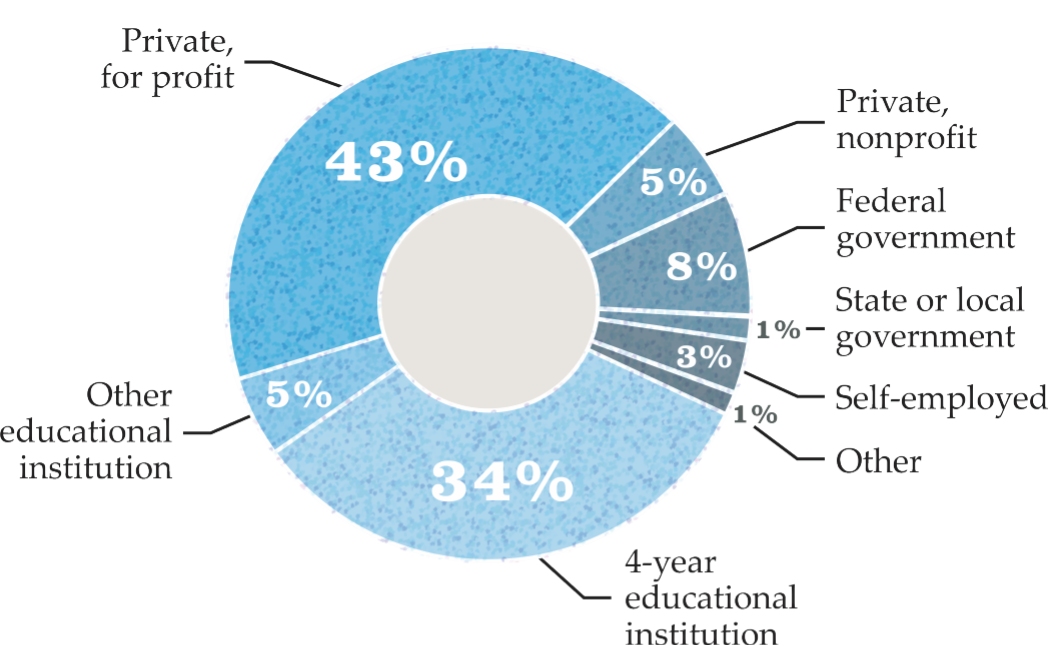
In this article we examine the different career paths of PhD physicists working in private industry, academia, and government, and we describe what physicists in different sectors find rewarding about their chosen careers.
In the first-ever 10-year follow-up survey of physics PhD recipients, the Statistical Research Center at the American Institute of Physics (AIP), which also publishes Physics Today, contacted physics PhD recipients from the classes of 1996, 1997, 2000, and 2001 who were in the US during 2011. Data used in this article were collected from more than 1800 respondents who participated in that PhD Plus 10 Study. We asked a variety of questions about respondents’ postdoctoral positions, their first jobs after receiving their doctorates, and their jobs at the time of the survey. Respondents reported whether they worked in academia (universities or other two- or four-year institutions), for the government (military; national labs; or a local, state, or federal agency), or in the industrial sector (government contractor, private company, or self-employed).
Who pursues a postdoc?
The first step in a new PhD’s career is typically the decision of whether to pursue a postdoc. According to AIP’s most recent follow-up survey of physics degree recipients in 2015–16, 47% of PhD graduates accept postdoc positions. Not all physicists pursue postdocs, and our PhD Plus 10 data show that postdoc decisions were different across sectors. We found that far fewer physicists working in industry accepted postdoc positions. When we asked if they would do so again, nearly a third of industrial physicists who took a postdoc said they would not (see figure
Figure 2. Percentage of PhD physicists in each sector who accepted postdoctoral positions, physics PhD classes of 1996, 1997, 2000, and 2001. Respondents were also asked if they would accept their postdoc again if given the chance. Figure 3. Number of years in postdoctoral positions by sector, physics PhD classes of 1996, 1997, 2000, and 2001. PhD physicists in academia spent the most time in postdoc positions; those in industry spent the least.
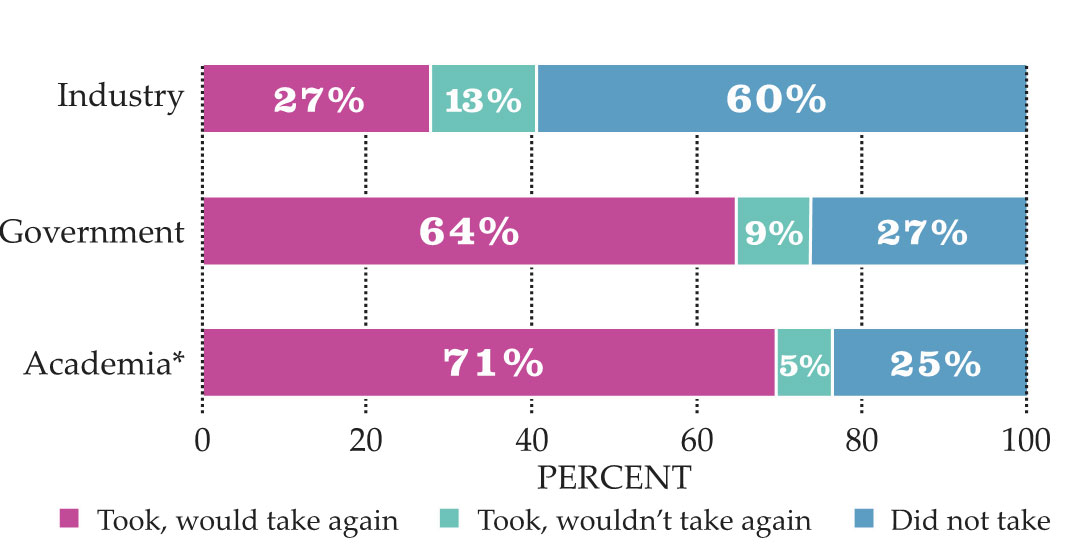

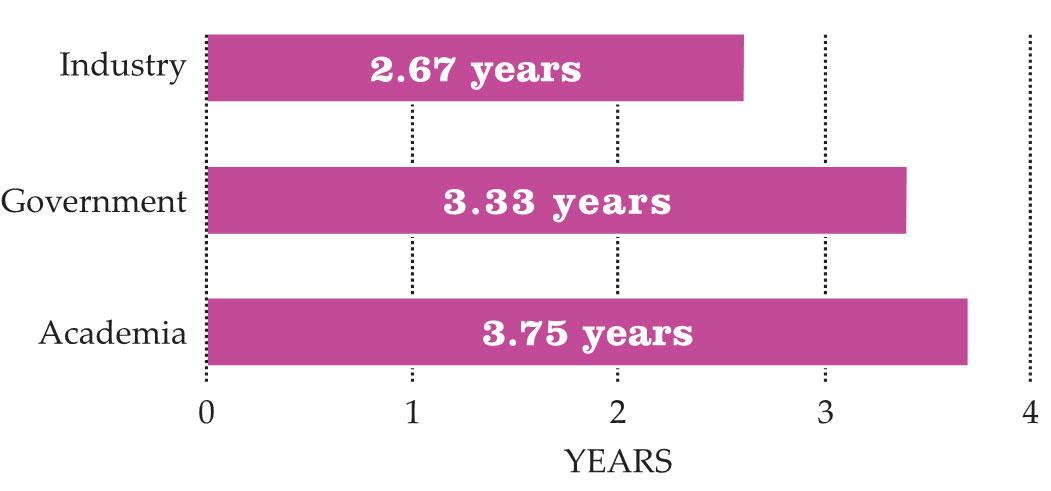
Of the physicists in our survey, 8% declined postdoc offers and reported their reasons for doing so. They made that choice because they found permanent positions elsewhere, they were no longer interested in an academic career, the postdoc salary was too low, they could not relocate, or they wanted to start a family. Those responses suggest that financial and family considerations are important factors in a PhD physicist’s decision to pursue the postdoctoral path.
Do careers change over time?
Since we knew PhD physicists’ first and current jobs, we were able to look at different types of movement across careers. Our survey analysis focused on three questions about career movement:
• Did respondents move across sectors during their careers?
• Did respondents stay with the same employer?
• Did respondents change fields during their careers?
We found little movement across career sectors. Almost all PhD physicists were still working in the same broad sector—industry, academia, or government—in which they had accepted their first job after a postdoc (see figure
Figure 4.

Movement between first and current job sectors, physics PhD classes of 1996, 1997, 2000, and 2001. The width of the bar corresponds to the proportion of people in a particular sector.
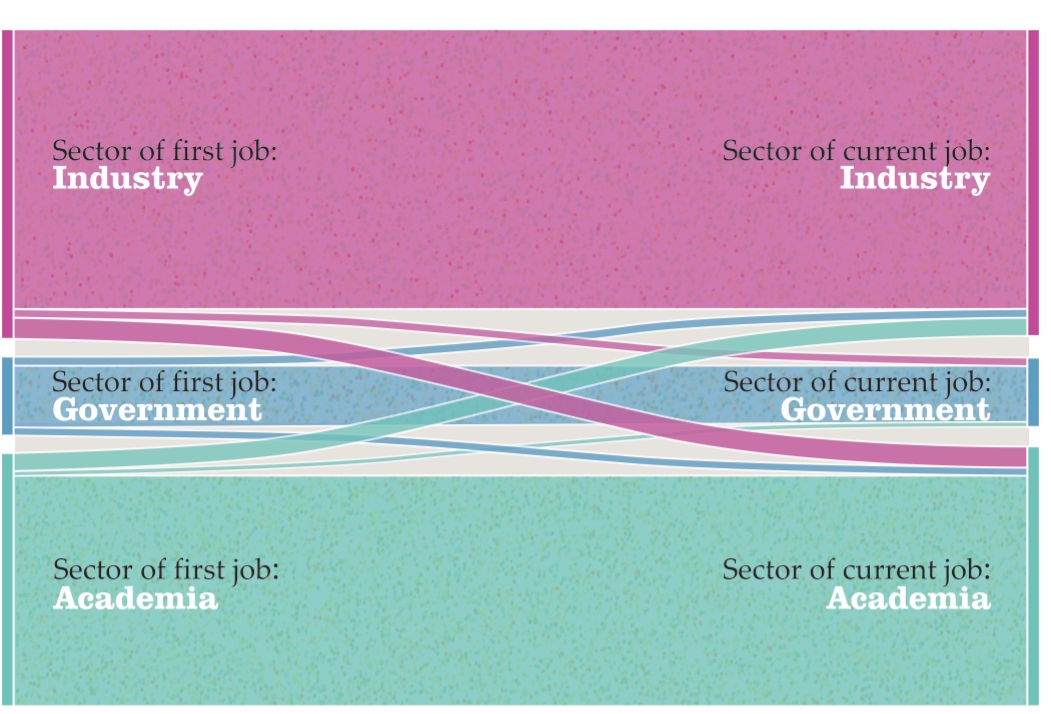
We saw wide variation in physicists’ tendency to switch employers depending on their job sector (see figure
Figure 5.

Movement between employers by sector, physics PhD classes of 1996, 1997, 2000, and 2001. PhD physicists working in industry were more likely to have changed employers than those in the academic or government sectors.
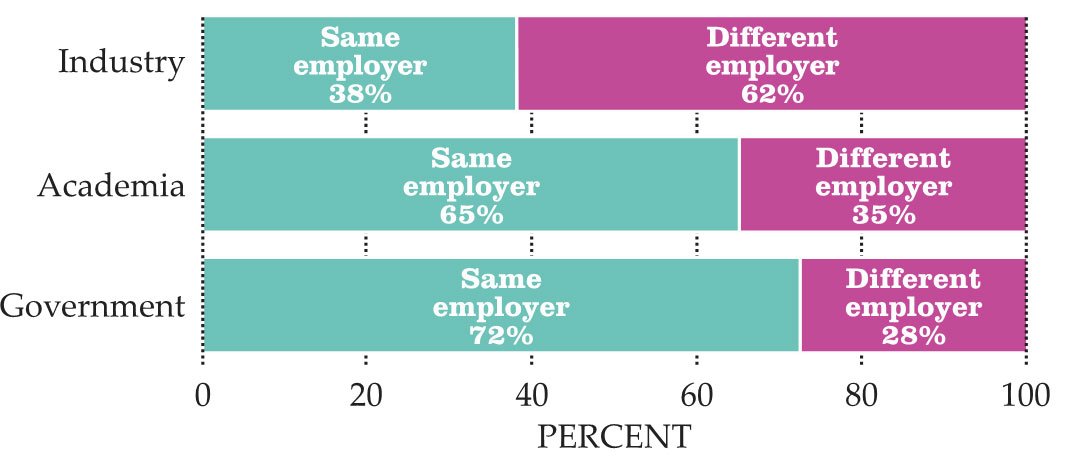
Lastly, we examined movement between job fields (figure
Figure 6.

Movement between employment fields by sector, physics PhD classes of 1996, 1997, 2000, and 2001. Most PhD physicists working in industry were in a field other than physics or astronomy.
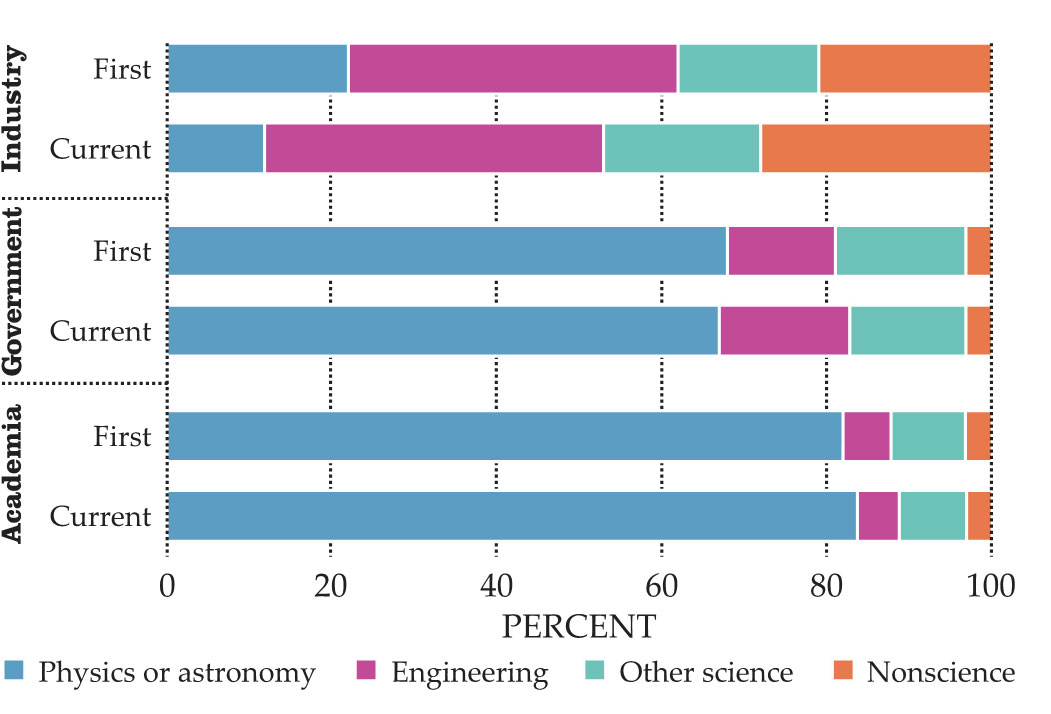
What rewards do jobs in the different sectors offer?
We also asked physicists, “What are the most rewarding aspects of your current job?” In examining more than 1300 quotes from our respondents, we found far more similarities than differences across the three sectors (see figure
Figure 7.

Job rewards by sector, physics PhD classes of 1996, 1997, 2000, and 2001. Some job rewards are universal across sectors; others tend to be mentioned more often by PhD physicists working in a specific sector.
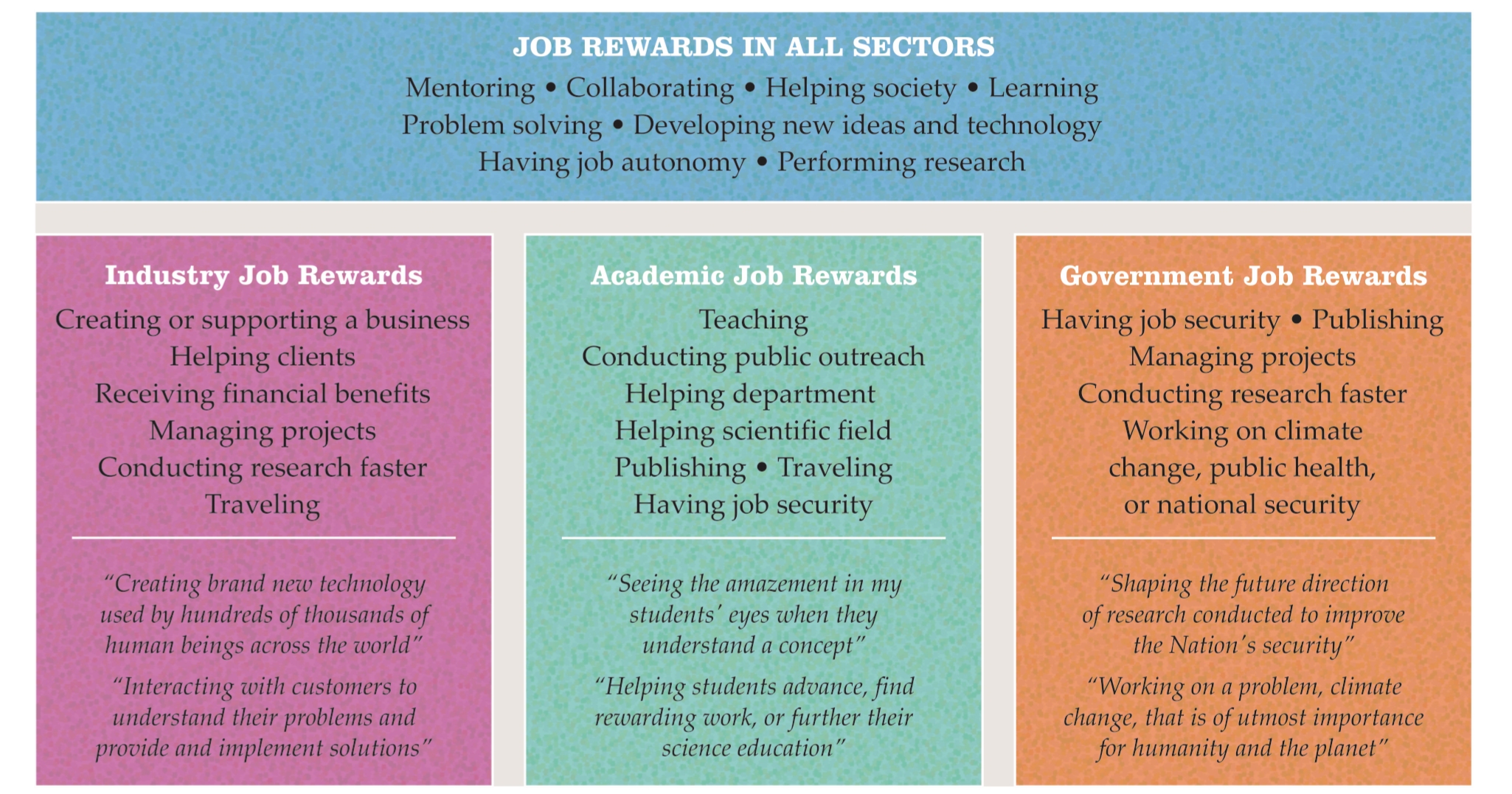
Each sector is also unique, and physicists in the three sectors identified specific aspects of their jobs as rewarding. For example, academic physicists felt rewarded when teaching students, performing public outreach to improve science literacy, and helping their departments or the larger scientific field. Industry physicists felt rewarded when helping their clients, supporting their company, and receiving financial benefits like higher salaries and stock options. Government physicists appreciated that they had more job security and conducted research at a faster pace than academics; they also felt rewarded when addressing larger societal issues such as climate change and national security.
Figure 8.

Responses to the question “Is this job intellectually challenging?” by sector, physics PhD classes of 1996, 1997, 2000, and 2001. Even though PhD physicists working in industry were less likely to report that their job was intellectually challenging, they did not report lower job satisfaction than their peers in the academic or government sectors.
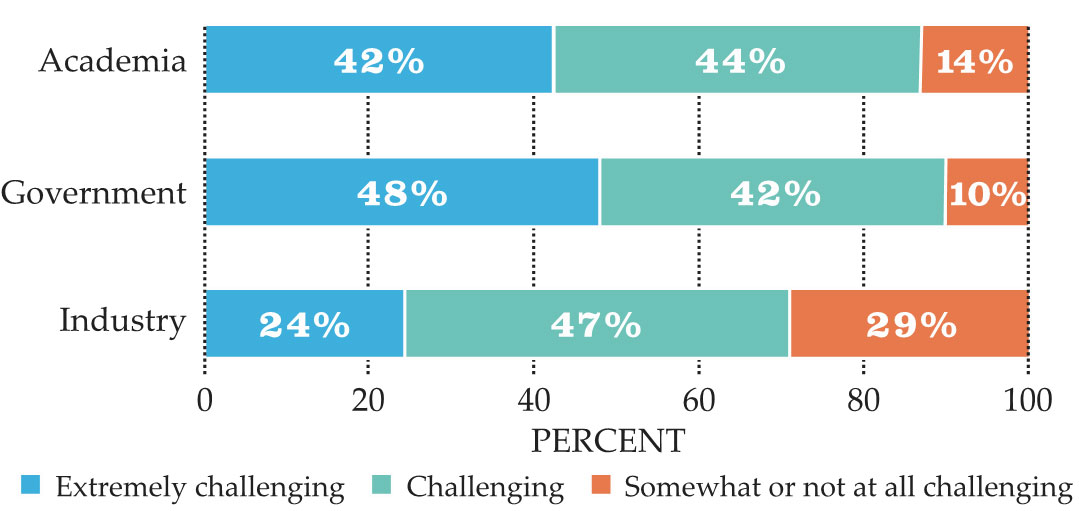
When we asked PhD physicists whether they found their jobs intellectually challenging, those in government and academic positions were more likely to respond in the affirmative than those in industry (see figure 8). However, there is no evidence that industrial physicists are less satisfied with their jobs than their counterparts in academia and government. Although industry physicists may feel less intellectually challenged, they may encounter different types of problems that they enjoy tackling and solving.

STUART KINLOUGH/ALAMY STOCK PHOTO

Diverging or converging roads?
The career options available to PhD physicists are varied. Our data provide insight into the satisfaction that midcareer PhD physicists have found (see online resources on
Online resources
If you are interested in reading more about the careers of PhD physicists or gaining inspiration for job searches outside academia, the following reports are available on the American Institute of Physics website.
► Who’s Hiring Physics PhDs (www.aip.org/statistics/whos-hiring-physics-phds
► Common Careers of Physicists in the Private Sector (www.aip.org/sites/default/files/statistics/phd-plus-10/PhysPrivSect.pdf
► Physics PhDs Ten Years Later: Duties and Rewards in Government Positions (www.aip.org/sites/default/files/phd%2B10-gov-dutiesnrewards.pdf
► Physics PhDs Ten Years Later: Duties and Rewards in Academic Positions (www.aip.org/sites/default/files/phd%2B10-acad-dutiesnrewards.pdf
The roads in Frost’s poem diverge, and the narrator chooses one. Later, the narrator notes, “Yet knowing how way leads on to way, I doubted if I should ever come back.” We do not know whether the narrator ever went back. Can a PhD physicist? We have seen that most remain in the same sector as their first full-time job. However, some do change their career path over time. The options are many and varied. Which road will you take?
More about the authors
Anne Marie Porter and Susan White are survey researchers in the Statistical Research Center at the American Institute of Physics in College Park, Maryland.






